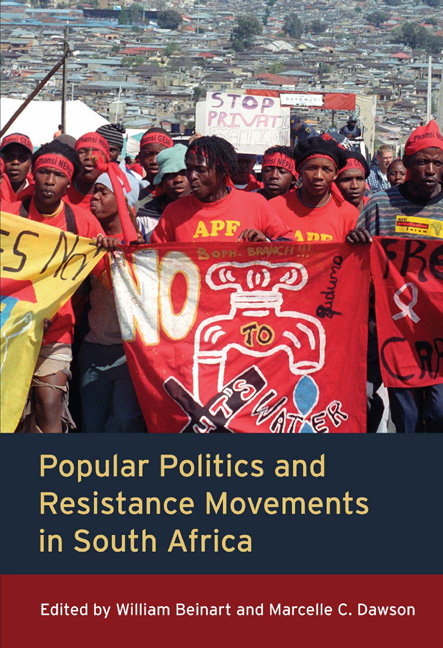Book contents
- Frontmatter
- Contents
- Contributors
- List of Abbreviations and Acronyms
- 1 Popular politics and resistance movements in South Africa, 1970–2008
- 2 The Durban strikes of 1973: Political identities and the management of protest
- 3 ‘There's more to it than slurp and burp’: The Fatti's & Moni's strike and the use of boycotts in mass resistance in Cape Town
- 4 The role of the African National Congress in popular protest during the township uprisings, 1984–1989
- 5 Strategies of struggle: The Nelson Mandela campaign
- 6 From removals to reform: Land struggles in Weenen in KwaZulu-Natal, South Africa
- 7 From popular resistance to populist politics in the Transkei
- 8 ‘It's a beautiful struggle’: Siyayinqoba/Beat it! and the HIV/AIDS treatment struggle on South African television
- 9 The Nelson Mandela Museum and the tyranny of political symbols
- 10 Black nurses’ strikes at Baragwanath Hospital, Soweto, 1948–2007
- 11 The ‘New Struggle’: Resources, networks and the formation of the Treatment Action Campaign (TAC) 1994–1998
- 12 New social movements as civil society: The case of past and present Soweto
- 13 ‘Phansi Privatisation! Phansi!’: The Anti-Privatisation Forum and ideology in social movements
- Endnotes
- Bibliography
- Index
5 - Strategies of struggle: The Nelson Mandela campaign
Published online by Cambridge University Press: 21 April 2018
- Frontmatter
- Contents
- Contributors
- List of Abbreviations and Acronyms
- 1 Popular politics and resistance movements in South Africa, 1970–2008
- 2 The Durban strikes of 1973: Political identities and the management of protest
- 3 ‘There's more to it than slurp and burp’: The Fatti's & Moni's strike and the use of boycotts in mass resistance in Cape Town
- 4 The role of the African National Congress in popular protest during the township uprisings, 1984–1989
- 5 Strategies of struggle: The Nelson Mandela campaign
- 6 From removals to reform: Land struggles in Weenen in KwaZulu-Natal, South Africa
- 7 From popular resistance to populist politics in the Transkei
- 8 ‘It's a beautiful struggle’: Siyayinqoba/Beat it! and the HIV/AIDS treatment struggle on South African television
- 9 The Nelson Mandela Museum and the tyranny of political symbols
- 10 Black nurses’ strikes at Baragwanath Hospital, Soweto, 1948–2007
- 11 The ‘New Struggle’: Resources, networks and the formation of the Treatment Action Campaign (TAC) 1994–1998
- 12 New social movements as civil society: The case of past and present Soweto
- 13 ‘Phansi Privatisation! Phansi!’: The Anti-Privatisation Forum and ideology in social movements
- Endnotes
- Bibliography
- Index
Summary
Introduction
Popular politics has crossed international boundaries, and Hakan Thorn analyses the international anti-apartheid struggle as a significant modern international social movement linked to the internal struggle. Chapters in this book explore these connections, illustrating interactions between global and local political ideologies and strategies. The struggle against apartheid took various forms and utilised different techniques. This paper considers one such technique – the focus on Nelson Mandela as a symbol of struggle. The focus on Mandela played a role in both the internal and external struggle and Mandela was instilled with a multitude of meanings. In the postapartheid period Mandela was again adopted by a range of political groups to highlight aspects of the transition to post-apartheid South Africa. Some of the conflicting ways in which Mandela's name and image were appropriated are elaborated in chapters by Fana Sihlongonyane and Rebecca Hodes. This chapter focuses on how Mandela was used in international anti-apartheid campaigns in order to attract support for and solidarity with the struggle against apartheid. In Britain the Anti-Apartheid Movement (AAM), an organisation formed in 1960 consisting of both British citizens and South African exiles, ran an impressive campaign centring on Mandela and making him better known to the British public. Wole Soyinka commented that Mandela's individual identity was subsumed by the many campaigns that made him into a struggle symbol. I discuss the importance of the Mandela Campaign internationally and comment on some simultaneous developments within South Africa.
A central argument concerns the attempts by the AAM to broaden international support by emphasising human rights and de-emphasising the armed struggle. Political prisoners made Western governments, still tolerant of the South African regime, uneasy and a campaign based on rights and justice offered the possibility of broadening support. The African National Congress (ANC) and AAM were concerned about a cult of personality, but realised the value of humanising the abstract issues of the struggle and elevating recognisable personalities. In this way, they contributed to the iconography of Mandela as a central element of popular politics. Mandela's name boomeranged back and forth from South Africa to Europe, gaining recognition, adherents and moral force as his story was told.
- Type
- Chapter
- Information
- Popular Politics and Resistance Movements in South Africa , pp. 94 - 116Publisher: Wits University PressPrint publication year: 2010

